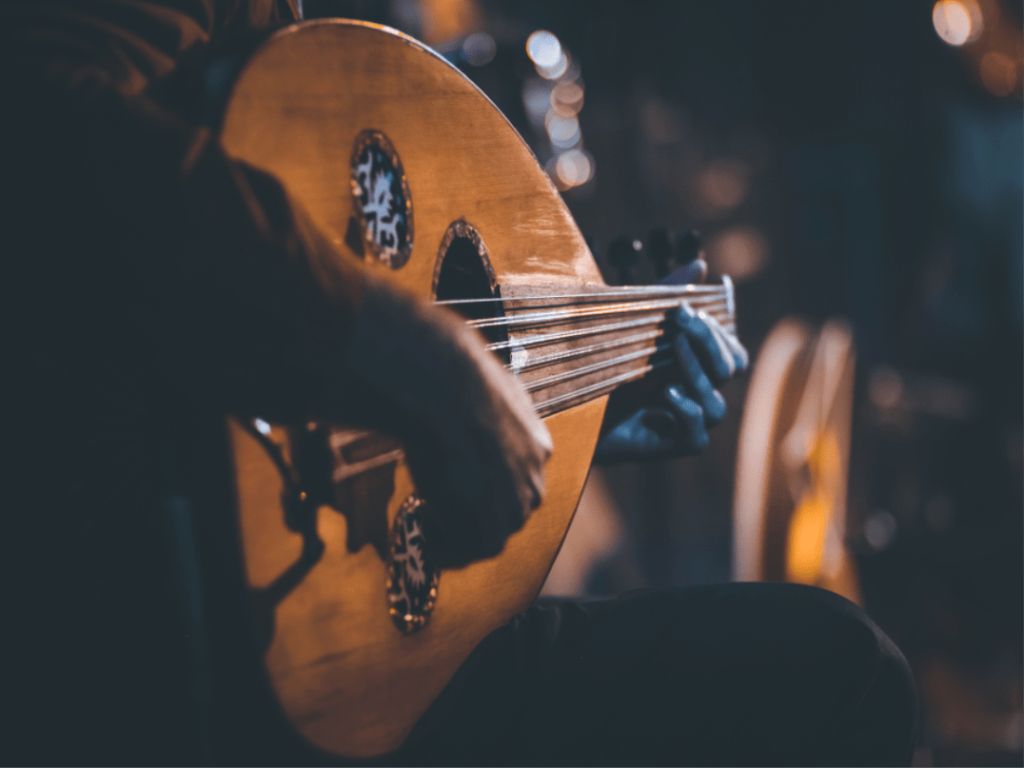Have you ever listened to an Arabic song and felt your heart resonate with the melody? People know this feeling as tarab in Arabic music. Tarab is not just about listening to music; it is a state of spiritual ecstasy that touches the soul and mind. If you are wondering about the tarab meaning, this article is your guide to exploring this unique concept, from its definition to its most important artists.
What is Tarab?
Tarab, or tarab music arabic, is a term that cannot be translated with a single word. We define Tarab as a state of rapture or enchantment. A listener who is deeply moved by a musical performance experiences it. The experience is an active one, a two-way street between the artist and the audience. Tarab is a state of heightened emotional connection and aesthetic pleasure. The lines between the artist and the audience blur and they share the same feeling of music’s mystical ecstasy.
The Role of the Audience in Tarab
Tarab requires an engaged audience to happen. The audience’s role is vital, as they are not just passive listeners but active participants. They show their appreciation and emotional connection through:
- Vocal Interaction: The audience expresses its admiration with spontaneous vocalizations and phrases like “Allah!” (God!), “Yā ʿaynī!” (Oh, my eye!), and “Kīf!” (How!). This continuous feedback encourages the artist and can influence the length and emotional intensity of the song.
- Emotional and Physical Interaction: Listeners can show their feelings through tears, applause, and subtle body movements. This creates a dynamic feedback loop that drives the performance to new heights.
Musicians and Famous Tarab Songs
Throughout history, many musicians have become famous for their ability to induce tarab in their audience. These artists were masters of improvisation and vocal technique. Here are some of the most famous musicians known for inducing tarab:
Umm Kulthum
People nicknamed her “Kawkab al-Sharq” (Star of the East). She is an icon of tarab. Her performances often lasted for hours. She repeated a single line over and over, subtly altering the emotional emphasis. She also improvised new melodies. This would build a powerful emotional connection with her audience.
- Famous Tarab Songs: “Anta ʿUmrī” (You are my life), “Al-Atlal” (The Ruins), and “Fakkarouni” (They Reminded Me).
Fairuz
The “Jewel of Lebanon,” she is known for her calm and beautiful voice. Her songs carry deep meanings of love and homeland. Her music has a serene, melancholic quality. It can still evoke a powerful emotional response from listeners.
- Famous Tarab Songs: “Li Beirut” (To Beirut), “Nassam ʿalayna al-Hawā” (The Wind Blew Upon Us), and “Habitak ta Neseet al-Nawm” (I Loved You So Much I Forgot How to Sleep).
Mohammed Abdel Wahab
We consider him one of the innovators of Arabic music. He masterfully blended classical Arabic melodies with Western instruments. This created a new style of tarab. His long, complex songs had rich musical arrangements.
- Famous Tarab Songs: “Ya Musahirni” (You who keep me up all night), “Enta Omri” (written for Umm Kulthum), and “Emta El Zaman” (When Time).
Abdel Halim Hafez
People knew him as “al-‘Andalīb al-Asmar” (The Brown Nightingale). He was one of the most famous singers of his time. His romantic and emotional songs could easily bring an audience to a state of tarab. His concerts were always sold-out events.
- Famous Tarab Songs: “Qariat al-Finjan” (The Fortune Teller) and “Ahwak” (I Adore You).
Sabah Fakhri
This Syrian singer was a master of the classical Arabic forms of Muwashahat and Qudud Halabiya. His powerful, resonant voice and masterful improvisation made him a legend of tarab. He is especially known for his live performances. There he would sing for hours without a break.
- Famous Tarab Songs: “Qadduka al-Mayyas” (Your Stature is Like a Swaying Branch) and “Ya Mal al-Sham” (Oh, Wealth of Sham).
Warda Al-Jazairia
People called her “the Algerian Rose.” She was a powerful singer famous for her emotional and dramatic performances. She combined her strong Algerian heritage with the classical Egyptian music style. This created a unique sound.
- Famous Tarab Songs: “Batwanes Beek” (I Feel At Home With You) and “Fi Youm Wi Leilah” (In One Day and Night).
Farid al-Atrash
A legendary Egyptian-Syrian composer, singer, and oud virtuoso. We knew him as “King of the Oud.” His songs were often romantic and melancholic. We considered his playing revolutionary.
- Famous Tarab Songs: “Awel Hamsa” (The First Whisper) and “Nora Ya Nora.”
Conclusion
Tarab music arabic is more than just an art form; it is a unique cultural and emotional experience. By listening to tarab songs and understanding their meanings, you can open a new door to a deeper understanding of the Arabic language and culture. For more great resources on Arab culture and to master the language, be sure to download the Kaleela Arabic learning app today!



